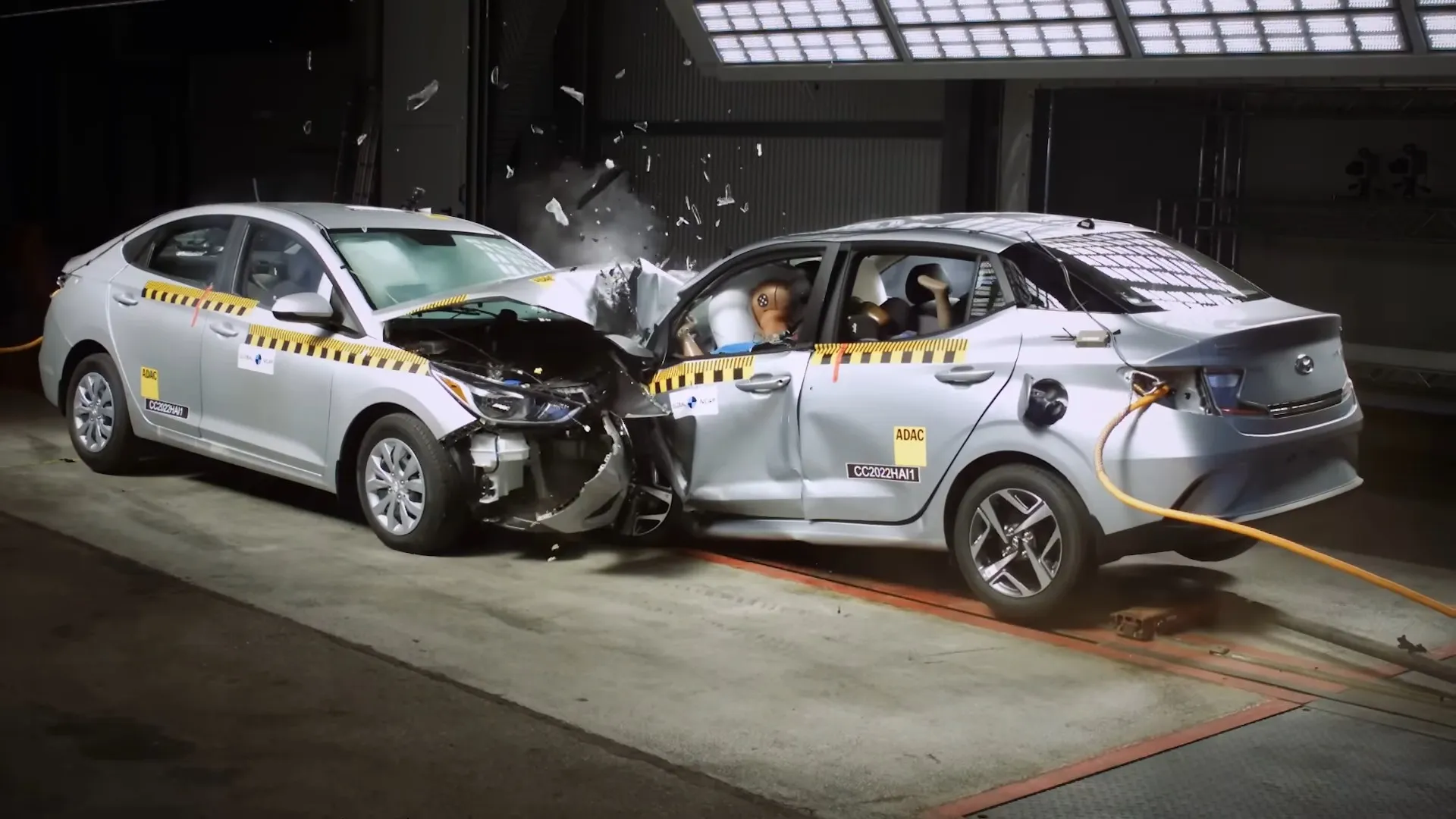FMVSS 208 Frontal Impact Crash Test
The Federal Motor Vehicle Safety Standard (FMVSS) 208 requires all passenger cars and light trucks to undergo a series of crash tests designed to evaluate the vehicle's structural integrity, occupant protection systems, and overall safety performance in frontal impact scenarios. This regulation is critical for ensuring that vehicles meet rigorous standards set forth by the National Highway Traffic Safety Administration (NHTSA).
The FMVSS 208 test involves a controlled collision between a test vehicle and a rigid barrier at an angle of approximately 30 degrees, with a speed typically ranging from 31 to 40 mph. The primary objective is to simulate the most common type of frontal impact that occurs in real-world accidents. This standard aims not only to protect occupants but also to ensure that the vehicle structure remains intact and that airbags deploy correctly.
The test setup includes a rigid barrier made from steel with specific dimensions, which ensures consistent results across different laboratories. The vehicle is equipped with instrumentation capable of measuring acceleration, deceleration, and other critical parameters during the impact. Following the crash, detailed assessments are conducted to evaluate various aspects such as structural deformation, occupant restraint system performance, and injury metrics.
For accurate and reliable testing, it is essential that all components of the vehicle being tested comply with FMVSS 208 requirements. This includes ensuring proper installation of airbags, seat belts, and other safety features. Additionally, the vehicle must be prepared according to specified guidelines before undergoing the crash test.
The results from these tests play a crucial role in shaping automotive design improvements aimed at enhancing passenger safety. By adhering to FMVSS 208 standards, manufacturers can demonstrate compliance with regulatory requirements while also showcasing their commitment to producing safer vehicles for consumers.
Understanding how this standard applies specifically to your project will help ensure successful testing outcomes. Our experienced team of engineers and technicians is dedicated to providing comprehensive support throughout the entire process—from initial consultation through final analysis report delivery. Let us assist you in meeting all necessary FMVSS 208 criteria for your next vehicle release.
Benefits
The benefits of undergoing an FMVSS 208 crash test are numerous, particularly for automotive manufacturers focused on enhancing passenger safety and meeting regulatory standards. Firstly, compliance with this standard demonstrates a commitment to producing vehicles that meet or exceed government-mandated safety requirements. This can significantly enhance consumer confidence and brand reputation.
- Enhanced Consumer Confidence: By ensuring that vehicles comply with FMVSS 208, manufacturers signal their dedication to passenger safety. Such compliance fosters trust among consumers who value high standards of automotive safety.
- Regulatory Compliance: Meeting these stringent requirements helps avoid potential legal issues and financial penalties associated with non-compliance.
- Competitive Edge: Demonstrating adherence to international safety protocols can give manufacturers a competitive advantage in the marketplace. It shows that they are committed to excellence in vehicle design and manufacturing.
In addition, successful completion of FMVSS 208 tests provides valuable insights into potential areas for improvement within a vehicle's structural integrity and occupant protection systems. This data can be used to refine future designs, leading to safer vehicles overall.
By investing in rigorous FMVSS 208 crash testing, automotive manufacturers not only comply with legal obligations but also contribute positively towards advancing global automotive safety standards.
Customer Impact and Satisfaction
- Increased Safety: By ensuring that vehicles meet FMVSS 208 standards, customers gain peace of mind knowing they are driving safer cars. This increased sense of security can lead to higher customer satisfaction levels.
- Better Reputation: Demonstrating compliance with international safety regulations enhances a manufacturer's reputation and brand image, which in turn increases customer loyalty.
- Improved Product Quality: The process of preparing for and completing FMVSS 208 tests encourages manufacturers to focus on product quality, leading to better overall vehicle performance.
Our laboratory strives to deliver accurate, reliable results that meet or exceed customer expectations. We understand the importance of these tests in maintaining a high level of customer satisfaction, and we are committed to providing exceptional service throughout the entire testing process.
Through meticulous preparation and execution, our team ensures that each test provides valuable insights into vehicle safety performance. These findings help manufacturers make informed decisions about necessary improvements, ultimately resulting in safer vehicles for consumers worldwide.
International Acceptance and Recognition
- Global Standard: FMVSS 208 is recognized globally as a benchmark for frontal impact safety testing. Its acceptance extends beyond the United States, making it an international standard that many countries reference in their own regulations.
- Cross-Industry Approval: The stringent criteria set by this standard are widely accepted across various segments of the automotive industry, ensuring consistent quality and performance standards worldwide.
The FMVSS 208 test is a critical component of global automotive safety initiatives. By adhering to these rigorous requirements, manufacturers can ensure that their vehicles meet international standards, thereby facilitating trade and interoperability between different markets.
Our laboratory ensures that every test conducted meets the exacting standards required by FMVSS 208, helping manufacturers gain acceptance in multiple global markets. This consistency supports the goals of various automotive safety programs aimed at reducing accidents and improving road safety worldwide.





